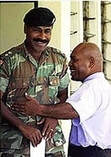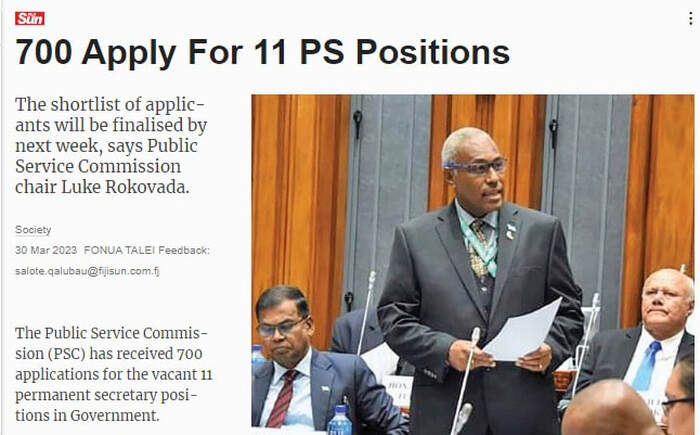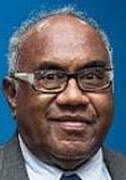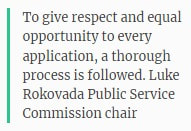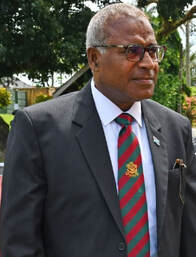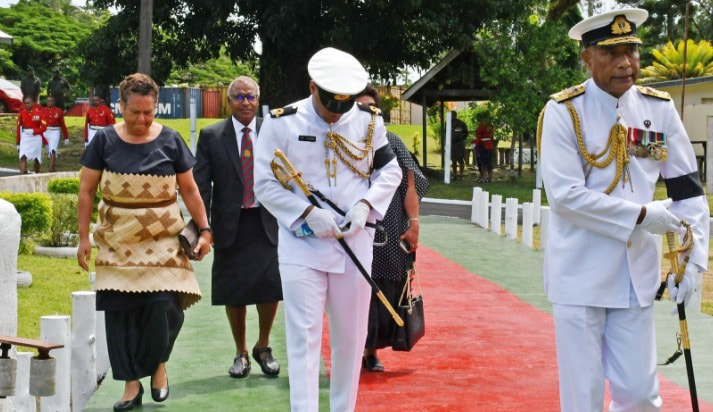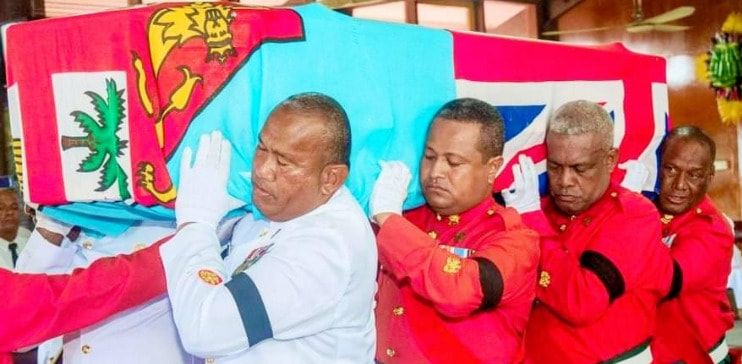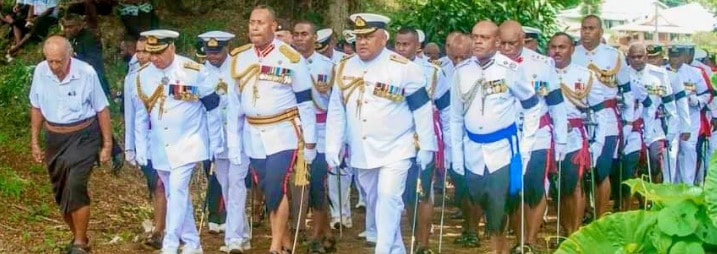*We were somewhat shocked at the speed with which the Public Service Commission dealt with the confirmation of the appointment of Colonel Filipo Tarakinikini as PRUN (Permanent Representative to the UN) since the applications according to the advertisement closed on the 22 March, which made us wonder if the process of selection adopted by the Commission was thorough enough and transparent in order "to give respect and equal opportunity to every applicant" for the post of PRUN.
* Doesn't the appointment of Tarakinikini remind us how Mohammed Saneem had been convicted by the Fiji High Court for gross insubordination in the 2014 elections and yet Aiyaz Sayed Khaiyum defied the High Court decision and recommended to the Fiji Constitutional Services Commission that Saneem's contract be renewed without even carrying out any disciplinary proceedings against him following his court conviction.
*In Tarakinikini's case, at least there should have been an inquiry on his role in the 2000 coup and his High Court conviction as an army deserter. So, Bainimarama and Khaiyum's legacy of lies or my way or the highway continues under Rabuka's Coalition government.
*Meanwhile, we noticed that Tarakinikini even turned up at the memorial service of the late Ratu Epeli Ganilau at the RFMF Barracks, with no attempt to march him off the military grounds or for Commander Jone Kalouniwai to order his detainment for DESERTION.
*Fijileaks Founding Editor-in-Chief: In 2011, Tarakinikini had declined to co-operate or answer questions for the book that I was working on, based on highly confidential military documents and other sources, regarding his role in the formation of the CRW Unit, the events in Parliament in 2000, and the overthrow of the Chaudhry government by George Speight. To Speight and CRW mutineer Shane Stevens credit, both through my personal contacts, provided answers from behind the confines of the prison walls.
*Filipo Tarakinikini's UN appointment is another evidence of the complete i-Taukeinization of Fiji that Coupist Sitiveni began in 1987, and now assisted by the NFP leader BIMAN PRASAD who is silent as a political church mouse. During the elections he was screaming, Transparency and Accountability. Shockingly, no one is SPEAKING UP for Indo-Fijians and other non i-Taukei races.
*Why should we expect Prasad and his side-kick Poster Boy, RICHARD NAIDU, to remind us of the 2004 Fiji Supreme Court judgment against Tarakinikini that ruled that the former army colonel was a DESERTER.
*In Naidu's case, despite waiting for sentencing, the Suva lawyer is running around Fiji, asking taxpayers, on how his master Prasad should run ECONOMY.
*There is widespread perception, and gossip around grog bowls, that Naidu will be the latest beneficiary of the Coalition government - his conviction swept under the carpet, for why else he is so brazenly running around Fiji as chair of FRC?
*We will soon publish the Options that Naidu has regarding his CONVICTION
Fijileaks: We were somewhat shocked at the speed with which the Public Service Commission dealt with the confirmation of the appointment of Colonel Filipo Tarakinikini as PRUN (Permanent Representative to the UN) since the applications according to the advertisement closed on the 22 March, which made us wonder if the process of selection adopted by the Commission was thorough enough and transparent in order "to give respect and equal opportunity to every applicant" for the post of PRUN.
*Additionally, we wonder why the process of shortlisting applicants for the post of PRUN was not given to the same recruitment agency working with the PSC to shortlist the 700 applicants for the 11 PS positions, especially since there has been a lot of adverse public reactions in the social media to the initial acting appointment of Tarakinikini.
*At least the Commission would have avoided being accused of employing double standards in the appointment of Permanent Secretaries and Heads of Missions, both of which appointments require the concurrence of the Prime Minister.
*The normal PSC procedure for the appointment of Permanent Secretaries and Heads of Missions (if not handled by Recruitment agencies) is that when the deadline for the applications is closed, the PSC would then vet and evaluate each candidate.
*Once the short list is drawn up in order of merit and preference, the PSC would then refer the list to the PS for Foreign Affairs (in respect of Ambassadorial applications) for his views and comments on each candidate.
*Then the list comes back to the PSC for the Directorate of the Personnel Division to carry out their usual vetting process (including police clearance) and upon completion of that exercise, they submit their findings to the SPS who will then put up his recommendations and short list to the PSC Chairman for consideration by the Commission.
*After the Commission has made its decisions, the Chair or the SPS will then seek the endorsement of the PM to the proposed appointments by the Commission.
*It is a normal procedure for the Commission to submit to the PM a short list of at least 5 candidates, in order of preference, whom they consider eminently qualified and suitable to be appointed for each individual post.
*This process gives the PM greater freedom and transparency to select anyone from among the five candidates presented to him by the Commission rather than deciding on one single candidate which can smack of nepotism, graft, etc.
*If he is unhappy with all the candidates recommended then the post is re-advertised.
*Meanwhile, we noticed that Tarakinikini even turned up at the memorial service of the late Ratu Epeli Ganilau at the RFMF Barracks, with no attempt to march him off the military grounds or for Commander Jone Kalouniwai to order his detainment for DESERTION.
Tarakinikini v Commander Republic of Fiji Military Forces [2004] FJSC 8; CBV0007.2003S (21 May 2004)IN THE SUPREME COURT, FIJI ISLANDS
AT SUVA
CIVIL APPEAL NO: CBV0007 OF 2003S
(Fiji Court of Appeal Civil Action No. ABU0049 of 2002S)
BETWEEN:
LT. COLONEL FILIPO TARAKINIKINI
Petitioner
AND:
1. COMMANDER REPUBLIC OF FIJI MILITARY FORCES
2. RATU JOSEFA ILOILO – PRESIDENT OF THE REPUBLIC OF FIJI ISLANDS
3. THE ATTORNEY GENERAL OF FIJI
Respondents
Coram: Hon. Justice Daniel V. Fatiaki, President of Supreme Court
Rt. Hon. Justice Thomas Gault, Judge of Supreme Court
Hon. Justice Keith Mason, Judge of Supreme Court
Hearing: Friday, 14th May 2004, Suva
Counsel: Mr. K. Muaror, Mr. S. Matawalu for the Petitioner
Capt. A. Bale and Lt. Col. M. Aziz for the 1st Respondent
Mr. S. Banuve for 2nd & 3rd Respondents
Date of Judgment: Friday, 21st May 2004
AT SUVA
CIVIL APPEAL NO: CBV0007 OF 2003S
(Fiji Court of Appeal Civil Action No. ABU0049 of 2002S)
BETWEEN:
LT. COLONEL FILIPO TARAKINIKINI
Petitioner
AND:
1. COMMANDER REPUBLIC OF FIJI MILITARY FORCES
2. RATU JOSEFA ILOILO – PRESIDENT OF THE REPUBLIC OF FIJI ISLANDS
3. THE ATTORNEY GENERAL OF FIJI
Respondents
Coram: Hon. Justice Daniel V. Fatiaki, President of Supreme Court
Rt. Hon. Justice Thomas Gault, Judge of Supreme Court
Hon. Justice Keith Mason, Judge of Supreme Court
Hearing: Friday, 14th May 2004, Suva
Counsel: Mr. K. Muaror, Mr. S. Matawalu for the Petitioner
Capt. A. Bale and Lt. Col. M. Aziz for the 1st Respondent
Mr. S. Banuve for 2nd & 3rd Respondents
Date of Judgment: Friday, 21st May 2004
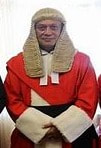 Justice Fatiaki
Justice Fatiaki JUDGMENT OF THE COURT
The Process for resigning a Commission in RFMF
(3) The Commander of the Republic of Fiji Military Forces is responsible for:
(a) making appointments of members of the Forces;
(b) taking disciplinary action against members of the Forces; and
(c) removing members from the Forces.
(4) The Parliament may make laws relating to the Republic of Fiji Military Forces.”
(a) all regimental claims have been paid;
(b) he is aware of any outstanding public claim against the officer;
(c) there is any objection to resignation being sanctioned;
(d) there is any special reason why such officer should not serve in the Reserve of Officer.(Amended by Order 7th October 1970*)
(2) Where an officer is permitted to resign, the resignation shall not take effect, unless otherwise ordered by the Governor General, until the acceptance is notified in the Gazette. (Amended by Order 7th October 1970*.)
(3) A regular officer who has been trained at Government expense at the Royal Military Academy, Sandhurst, or at any other Commonwealth Military College or Academy who applies to be posted to the Reserve of Officers or to resign his commission shall refund to Government the following amounts:
Within one year of being commissioned.............. $1,000
Within two years of being commissioned ............ $ 800
Within three years of being commissioned .......... $ 600
Within four years of being commissioned ........... $ 400
Within five years of being commissioned ............ $ 200”
(Inserted by Regulations 29th July 1952 )
....
The ... regulation requires a resignation to be considered by and commented on by the commanding officer of the officer who wishes to resign his commission. The commanding officer must forward it on to the Commander, whose obligation it is to submit it to the President. In both cases it can be assumed that information will be forwarded which will enable a decision to be made.
The decision must reflect the circumstances. It is plain that bearing in mind the history that a serving officer may not resign without permission and the wording of the regulation shows that the decision is not one which is automatic.
In such case the person making the decision must be provided with the necessary information to enable the decision to be made and to be one which will not impede the effectiveness of the armed forces. It is no doubt for that reason that the regulation contemplates that the resignation will be forwarded through the chain of command.
A chain of command is an important matter in the armed forces and this is reinforced by the necessity for a considered decision to be given in the case of the resignation of a commissioned officer.”
I have received your letter of resignation dated 27th February 2002. I have carefully considered your request and have decided that first you must return home as scheduled.
You will appreciate that my desire to have you returned is based precisely on the outcome of the formal Board of Inquiry conducted by Lt. Col J. Evans on the alleged participating by some members of the RFMF during the events of May 2000. It is for this reason alone that your presence is imminent to provide answers to these allegations.
You must understand that the interest of the Nation and in particular the RFMF is foremost and it is my intention to have the investigation completed as soon as possible.
In view of the above reasons, your request for release is not approved.
a. The investigation into the May 2000 coup;
b. The extension of my contract with UNDPKO;
c. My resignation;
d. The allegations against me;
e. Command.
....
My Resignation
With all due respects, your response to my resignation aims to cast doubt on me and is evasive and manipulative in avoiding issues. It says nothing of substance and is silent on the issues I raised as some of the reasons prompting my resignation. Sec 194 (2) (b) of the constitution provides me the absolute right to resign from the Force. I exercised this right in my letter of resignation dated 27th February. My resignation was formally accepted once received by you. Therefore it is effective no later than 18th March 2002 as that is the date of your reply.
....
Conclusion
I have defined five independent issues that have contributed to my resignation. In that I have explained that:
(ii) An Order that Certiorari do issue quashing the said decision of the First Respondent.
(iii) An Order that the First Respondent be estopped from denying that the Applicant has properly been cleared of all allegations during the investigations conducted by the Republic of Fiji Military Forces and Fiji Police Force in terms of the letter of the Prime Minister dated 19th January 2001 to the Secretary General to the United Nations.
(iv) An Order that Mandamus do issue requiring the First Respondent to transmit the Applicant’s resignation to the Second Respondent for his decision.
(v) Damages
(vi) Costs
(vii) Further or other relief as to this Honourable Court seems just and expedient.
The Judge also considered it appropriate to rule that the response of the Commander to the first letter in so far as it indicated that the application was being declined was not within the parameters of regulation 21 because such a decision was a matter for the President. It was because of that conclusion that the Judge issued an order for certiorari in respect of what he saw as a decision which the Commander was not empowered to make.
There has been no criticism of the procedures adopted in respect of the second letter other than perhaps by implication. That relates to the observation that investigation of the alleged conduct of Lt Colonel Tarakinikini is not a valid reason for refusing to accept the resignation.
We should make it clear we do not necessarily concur with the Judge in this conclusion. The material which the Commander makes available to the President must reflect all matters of concern to the Commander of the armed forces and will include the existence of material which may relate to conduct affecting the armed forces and their responsibilities to the State which it is appropriate to draw to the attention of the President.”
Since the first letter never found its way to the commanding officer the procedures were never set in train and we note that there were reasons why it may have not been appropriate for the Commander to send the first letter to the commanding officer bearing in mind the contentious material contained in the application. It was not a mere request for the resignation to be considered.
In the event whatever the consequences of the correspondence which occurred with respect to the first letter this was all overtaken by the second letter which was submitted by the Commander to the commanding officer. Having been received back with comments from the commanding officer it was then forwarded by the Commander to the President as contemplated by regulation 21.
In those circumstances we cannot see that there was a need for an order quashing the decision of the Commander with respect to the first letter since what occurred was in relation to an attempt to resign which had never reached the stage where any decision was required, whatever the Commander may have purported to do.
Nor was there any need for an order for certiorari as the procedures contemplated by regulation 21 were complied with in respect of the second letter. Certiorari was not appropriate where the preceding formality of reference to the commanding officer had not been complied with.”
Resolution of such a claim and entitlement to damages depends upon the filing of pleadings which define precisely the basis of the claim. There are no such pleadings in this case. The award of damages also depends upon the establishment of the right to recover them by evidence which has been the subject of appropriate testing.
There is no material in the case as recorded which could provide a justification for the granting of damages in respect of the tort referred to bearing in mind its establishment depends upon a proof of malice appropriate to the allegations concerned. It is wholly inappropriate for any such exercise to be conducted on the basis of affidavits.”
President of Supreme Court
- These are the reasons for the Court’s decision, announced at the conclusion of the hearing, to refuse special leave to appeal.
- The petitioner sought to challenge the order of the Court of Appeal which upheld an appeal from the High Court and made consequential orders that we set out below.
- The petitioner, Lt. Colonel Filipo Tarakinikini was first commissioned in the then Royal Fiji Military Forces in 1981. By May of 2000 he held the rank of Lieutenant Colonel in the Republic of Fiji Military Forces (RFMF). On 19 May 2000, he was purportedly appointed chief of staff by those responsible for the May 2000 coup under the leadership of George Speight. This led to investigations against him later that year for alleged involvement with the coup plotters. The petitioner has always denied any complicity in those matters.
- The petitioner was released on secondment to take up a 12 months United Nations posting abroad, such release being supported by the Prime Minister and approved by the Commander of the RFMF. He left to take up his appointment in March 2001.
- Later that year further allegations about him were released to the public. He contends that he has sought a full public inquiry into the events of the May 2000 coup as it affected his professional and personal situation. RFMF refused an extension of the United Nations secondment beyond the initial 12 months term.
- The petitioner has remained abroad. However, he has sought to resign his commission. The proceedings from which this appeal is brought were commenced in May 2002 and involve complaints and a claim for damages relating to the way in which RFMF has dealt with his application to resign.
The Process for resigning a Commission in RFMF
- Before addressing the facts it is convenient to set out the statutory framework as to resignation of a commission in RFMF. What follows is a summary of the detailed reasoning of the Court of Appeal. We do not understand it to be contentious.
- At common law an officer holding a commission in the armed forces is not free to resign at will (see generally Hearson v. Churchill [1892] UKLawRpKQB 125; [1892] 2 QB 144, Marks v. The Commonwealth [1964] HCA 45; [1964] 111 CLR 549).
- Section 112 of the constitution continues in existence the RFMF established by the Constitution of 1990. That section also provides:
(3) The Commander of the Republic of Fiji Military Forces is responsible for:
(a) making appointments of members of the Forces;
(b) taking disciplinary action against members of the Forces; and
(c) removing members from the Forces.
(4) The Parliament may make laws relating to the Republic of Fiji Military Forces.”
- Pursuant to s.67(b) of the Republic of Fiji Military Forces Act (Cap.81), the Minister may make regulations providing for the terms of service and appointment, duties, promotion, seniority, transfer, leave, resignation and release from service of officers. The presently relevant regulation is Reg. 21 which provides:
(a) all regimental claims have been paid;
(b) he is aware of any outstanding public claim against the officer;
(c) there is any objection to resignation being sanctioned;
(d) there is any special reason why such officer should not serve in the Reserve of Officer.(Amended by Order 7th October 1970*)
(2) Where an officer is permitted to resign, the resignation shall not take effect, unless otherwise ordered by the Governor General, until the acceptance is notified in the Gazette. (Amended by Order 7th October 1970*.)
(3) A regular officer who has been trained at Government expense at the Royal Military Academy, Sandhurst, or at any other Commonwealth Military College or Academy who applies to be posted to the Reserve of Officers or to resign his commission shall refund to Government the following amounts:
Within one year of being commissioned.............. $1,000
Within two years of being commissioned ............ $ 800
Within three years of being commissioned .......... $ 600
Within four years of being commissioned ........... $ 400
Within five years of being commissioned ............ $ 200”
(Inserted by Regulations 29th July 1952 )
- The reference to the Governor General in this regulation should now read as a reference to the President.
- The Court of Appeal held (at p.19) that s.112(3) of the Constitution was not affected by s.194(5) thereof in its application to the petitioner. Regulation 21 is the statutory framework within which the petitioner’s rights touching his decision to seek to resign are to be determined.
- The Court of Appeal pointed out that:
....
The ... regulation requires a resignation to be considered by and commented on by the commanding officer of the officer who wishes to resign his commission. The commanding officer must forward it on to the Commander, whose obligation it is to submit it to the President. In both cases it can be assumed that information will be forwarded which will enable a decision to be made.
The decision must reflect the circumstances. It is plain that bearing in mind the history that a serving officer may not resign without permission and the wording of the regulation shows that the decision is not one which is automatic.
In such case the person making the decision must be provided with the necessary information to enable the decision to be made and to be one which will not impede the effectiveness of the armed forces. It is no doubt for that reason that the regulation contemplates that the resignation will be forwarded through the chain of command.
A chain of command is an important matter in the armed forces and this is reinforced by the necessity for a considered decision to be given in the case of the resignation of a commissioned officer.”
- As indicated, the correctness of this analysis by the Court of Appeal was not questioned in this Court.
- On 27 February 2002 the petitioner tendered his resignation from RFMF with effect from 21 March 2002. He wrote (from New York) to the Commander, RFMF. The lengthy letter contained a deal of historical and explanatory material and it referred to recent telephone conversations between the Commander (Commodore F. V. Bainimarama, the first respondent) and himself. The letter (hereafter referred to as the first letter) clearly expressed the writer’s intentions to tender to the Commander his resignation with effect from 21 March 2002.
- As the Court of Appeal pointed out, the letter made no reference to Reg.21. Nor had it followed the procedure contemplated by the regulation, which (read fairly and in light of military practice) contemplated that a letter of resignation would be submitted in the first instance to the officer’s immediate commanding officer, who had the right and obligation to include material relevant to considering whether or not the resignation should be permitted, when forwarding the application to the Commander for transmission to the President.
- The Petitioner’s commanding officer at the time was Lt. Colonel Waqavakatoga.
- The Commander’s reply on 12 March 2002 was in the following terms:
I have received your letter of resignation dated 27th February 2002. I have carefully considered your request and have decided that first you must return home as scheduled.
You will appreciate that my desire to have you returned is based precisely on the outcome of the formal Board of Inquiry conducted by Lt. Col J. Evans on the alleged participating by some members of the RFMF during the events of May 2000. It is for this reason alone that your presence is imminent to provide answers to these allegations.
You must understand that the interest of the Nation and in particular the RFMF is foremost and it is my intention to have the investigation completed as soon as possible.
In view of the above reasons, your request for release is not approved.
- The petitioner made a lengthy reply to the Commander in a letter of 21 March 2002. The letter contains material explanatory of the petitioner’s role in the May 2000 coup and complains about the injustice of the RFMF’s decision not to permit the extension of the United Nations contract. On the subject of the resignation it said this:
a. The investigation into the May 2000 coup;
b. The extension of my contract with UNDPKO;
c. My resignation;
d. The allegations against me;
e. Command.
....
My Resignation
With all due respects, your response to my resignation aims to cast doubt on me and is evasive and manipulative in avoiding issues. It says nothing of substance and is silent on the issues I raised as some of the reasons prompting my resignation. Sec 194 (2) (b) of the constitution provides me the absolute right to resign from the Force. I exercised this right in my letter of resignation dated 27th February. My resignation was formally accepted once received by you. Therefore it is effective no later than 18th March 2002 as that is the date of your reply.
....
Conclusion
I have defined five independent issues that have contributed to my resignation. In that I have explained that:
- My resignation letter dated 27th February is, and has been since that date both lawful and irrevocable....”
- The petitioner’s claim in this letter that s.194(2) (b) of the Constitution gave him an absolute right to resign is not correct, as the Court of Appeal pointed out.
- Indeed, the petitioner appears to have recognised this early in the piece, because he wrote to the President and Commander in Chief of RFMF on 8 April 2002 complaining that his application to resign should have been transmitted to the President under Reg. 21. This letter was copied to the first respondent. On 22 April 2002 the petitioner’s legal advisers also wrote to the first respondent, referring to Reg.21 and calling upon the Commander to transmit the original letter of resignation to the President with the Commander’s comments on the matters set out under Regulation 21(1)(a)-(d). (The lawyers appear not to have recognized that the Commander was not the petitioner’s immediate commanding officer at the time.)
- On 28 April the petitioner wrote to the Acting Commander, RFMF, Lt Colonel Naivalurua confirming his intention to resign with effect from 21 March 2002. We refer to this as the second letter.
- On 2 May 2002 the first respondent directed that the Application for Resignation of Commission be actioned (affidavit of first respondent sworn 5 June 2002, par 12 (m)).
- On 10 May 2002 the letter of 28 April 2002 was forwarded by the Acting Commander to Lt. Colonel Waqavakatoga, the petitioner’s commanding officer. Lt. Colonel Waqavakatoga treated that letter as a letter of resignation delivered under Reg.21. On 31 May 2002 he submitted to the Acting Commander his “submissions and sanctions” in accordance with Reg. 21. In his affidavit of 5 June 2002, the first respondent indicated that the submission would be forwarded to the President “with sanctions”. This was done.
- These proceedings were commenced by Ex Parte Application under Part 53 of the High Court Rules on 13 May 2002. The Application seeks the following relief:
(ii) An Order that Certiorari do issue quashing the said decision of the First Respondent.
(iii) An Order that the First Respondent be estopped from denying that the Applicant has properly been cleared of all allegations during the investigations conducted by the Republic of Fiji Military Forces and Fiji Police Force in terms of the letter of the Prime Minister dated 19th January 2001 to the Secretary General to the United Nations.
(iv) An Order that Mandamus do issue requiring the First Respondent to transmit the Applicant’s resignation to the Second Respondent for his decision.
(v) Damages
(vi) Costs
(vii) Further or other relief as to this Honourable Court seems just and expedient.
- The President has taken no action pending the resolution of these proceedings. But this is not the subject matter of any complaint in the proceedings, which are focussed on the decision of the Commander evidenced by his letter of 12 March 2002.
- The Court of Appeal recorded that counsel were unable to indicate that Lt Colonel Tarakinikini had been disadvantaged by the second letter (of 28 April 2002) activating the procedure rather then the first (of 27 February 2002). The reasons for this become clear when it is recognized that (1) the orders of the Court of Appeal (see below) leave the petitioner free to litigate his claim for damages stemming from allegedly tortious conduct involved in the non-processing of the first letter; (2) the petitioner has always been at liberty to forward submissions directly to the President, and has done so; and (3) the stream of correspondence between the petitioner and his lawyers on the one hand and the President, members of government and superior officers on the other hand (only some of which we have referred to) shows that the later correspondence almost invariably incorporated reference back to the original letter of resignation. In short, there has been no impediment to the petitioner having the full text of his initial letter of resignation placed before whomever he wished.
- The primary judge (Byrne J) concluded that the petitioner had made it abundantly clear in his first letter that he intended to resign; and that the first respondent had knowingly failed to forward the letter to the President in terms of Reg 21. In what were described as interim orders, his Honour granted a declaration quashing the first respondent’s decision refusing to approve the notice of resignation and he directed that certiorari was to issue for that purpose. The Judge also found that requesting the petitioner to return for a further investigation without charging him with complicity in the events of May 2000 was “unreasonable in the ‘Wednesbury’ sense and arbitrary”. It was held that the petitioner had a right to claim damages for the tort of misfeasance in public office, but the Judge wished to hear further submissions before giving any decision as to the amount. No order in the nature of mandamus was made.
- The Court of Appeal upheld the respondents’ appeal.
- The Court held that the problems in this case have largely arisen because the procedures contemplated by Reg 21 were not followed in respect of the first letter and that consideration of this obscured the fact that the second letter did result in the contemplated procedures being followed.
- The Court recognized that the first letter indicated an intention to resign, but that matters were complicated by the petitioner including a great deal of material some of which was critical of the Commander to whom the letter was addressed. The petitioner further complicated the situation by addressing his letter to the Commander which delayed the procedures contemplated by Reg 21 since the letter would have had to be passed on to his commanding officer to obtain any comments relevant under the provisions of the Regulation.
- The Court of Appeal did not disagree with the primary judge’s characterisation of the first letter as a letter of resignation. But it was pointed out that the trial judge’s reasons had not referred to the fact that the procedures contemplated by Reg 21 had not been followed as regards that letter. The Court said (at 16-17):
The Judge also considered it appropriate to rule that the response of the Commander to the first letter in so far as it indicated that the application was being declined was not within the parameters of regulation 21 because such a decision was a matter for the President. It was because of that conclusion that the Judge issued an order for certiorari in respect of what he saw as a decision which the Commander was not empowered to make.
There has been no criticism of the procedures adopted in respect of the second letter other than perhaps by implication. That relates to the observation that investigation of the alleged conduct of Lt Colonel Tarakinikini is not a valid reason for refusing to accept the resignation.
We should make it clear we do not necessarily concur with the Judge in this conclusion. The material which the Commander makes available to the President must reflect all matters of concern to the Commander of the armed forces and will include the existence of material which may relate to conduct affecting the armed forces and their responsibilities to the State which it is appropriate to draw to the attention of the President.”
- The Court then addressed and rejected a submission by the present first respondent to the effect that Reg 21 had been overtaken by provisions in the Constitution. This conclusion is not under dispute in this Court.
- The orders by way of judicial review that had been granted at first instance were overturned by the Court of Appeal, essentially on discretionary grounds. The debate about the first respondent’s conduct referable to the first letter and the first respondent’s answering contentions based upon the petitioner’s own departures from due procedure were held to be hypothetical as regards these heads of relief. The nub of the reasoning was that (pp 20-21):
Since the first letter never found its way to the commanding officer the procedures were never set in train and we note that there were reasons why it may have not been appropriate for the Commander to send the first letter to the commanding officer bearing in mind the contentious material contained in the application. It was not a mere request for the resignation to be considered.
In the event whatever the consequences of the correspondence which occurred with respect to the first letter this was all overtaken by the second letter which was submitted by the Commander to the commanding officer. Having been received back with comments from the commanding officer it was then forwarded by the Commander to the President as contemplated by regulation 21.
In those circumstances we cannot see that there was a need for an order quashing the decision of the Commander with respect to the first letter since what occurred was in relation to an attempt to resign which had never reached the stage where any decision was required, whatever the Commander may have purported to do.
Nor was there any need for an order for certiorari as the procedures contemplated by regulation 21 were complied with in respect of the second letter. Certiorari was not appropriate where the preceding formality of reference to the commanding officer had not been complied with.”
- The Court of Appeal refused the order or declaration as to the Commander being estopped from denying that the petitioner had properly been cleared of all allegations during the investigations conducted before his departure to the United States to take up his post with the United Nations. The Court observed that an evidentiary basis for such a declaration had not been established. The Court also doubted that the proceedings were an appropriate vehicle for such a form of relief.
- Mandamus in regard to the transmission of the first letter was refused on discretionary grounds on the basis of inutility, given that the second letter had been referred to the President.
- As to the claim for damages, the Court held:
Resolution of such a claim and entitlement to damages depends upon the filing of pleadings which define precisely the basis of the claim. There are no such pleadings in this case. The award of damages also depends upon the establishment of the right to recover them by evidence which has been the subject of appropriate testing.
There is no material in the case as recorded which could provide a justification for the granting of damages in respect of the tort referred to bearing in mind its establishment depends upon a proof of malice appropriate to the allegations concerned. It is wholly inappropriate for any such exercise to be conducted on the basis of affidavits.”
- The Court of Appeal made the following orders:
- The appeal is therefore allowed and the order quashing the decision of the Commander, the first appellant, is itself quashed there being now no need for any such order.
- The order for certiorari is quashed.
- There is a direction that outstanding matters be remitted to the High Court with a direction that on the present state of the proceedings no order for damages can be made and that no such order can be made in the absence of pleadings defining the basis of the claim and a hearing to resolve contested facts. Consideration will need to be given by counsel as to whether or not the present proceedings form an appropriate vehicle for the resolution of outstanding issues with regard to damages.
- The petitioner submitted that the issues raised in this Court are matters of great or public importance, thereby attracting a grant of special leave within s.7(3)(b) of the Supreme Court Act.
- At several points in the written and oral submissions the petitioner sought to focus upon the importance of his allegations that the Commander’s conduct towards him provoked his tendered resignation. Alternatively, he contended that there is great or public importance in bringing to a head and resolving once and for all any suggestion made against him concerning alleged complicity in the May 2000 coup. The petition also contained a number of unverified allegations and assertions against the Commander and others.
- It must be stated firmly that these proceedings are not the venue for airing or determining these and other grievances. These are appellate proceedings involving a challenge to the orders of the Court of Appeal. These orders were made in resolution of particular issues agitated in the Court of Appeal. In turn, these issues arose out of the particular proceedings in the High Court.
- We have already drawn attention to the relief sought in the unamended initiating process in the High Court. With the exception of the estoppel declaration (that was properly rejected in the court below) it focusses upon the first respondent’s conduct as Commander in his 12 March 2002 response to the first letter of resignation. By the time of the proceedings in the Court of Appeal at the very latest, these issues had been confined to the operation of Reg 21 as regards the Commander’s response to the petitioner’s first letter of resignation.
- Counsel for the petitioner was pressed repeatedly at the hearing to formulate the legal issue presented in these proceedings at their current stage. He had difficulty in doing so, for understandable reasons.
- At one level, the petitioner sought to attract a grant of special leave by submissions of the broadest generality. He referred to the role of the armed forces in this country, the rule of law, and the importance of following due procedure in relation to a recurring matter such as applications to resign from the RFMF. The Court recognizes the importance of these matters, but it remains essential for a petitioner to demonstrate how they are engaged by the particular facts in the context of the particular legal issues raised in the particular proceedings.
- At another level, the written submissions of the appellant raised a number of purely factual disputes, mainly involving the interpretation of particular letters or the drawing of inferences as to the intentions of writers of those letters.
- The public law issues raised by the petitioner in so much of the proceedings as relates to judicial review were all focused upon the conduct of the first respondent in relation to the first letter. The letter clearly evidenced the petitioner’s intention to resign. But it did not invoke Reg 21; it went beyond the subject matter of resignation; it was not forwarded through the petitioner’s immediate commanding officer; and it was overtaken by other events well before the proceedings were commenced.
- These other events were the clarification involved in the second letter and initiation of the formal and due processing of that letter all the way to it being placed before the President accompanied by additional material compiled in accordance with Reg 21.
- We agree with the petitioner’s submissions that a letter of resignation need not be in any specified form, and that it is sufficient if a letter discloses a clear intention to resign. We would point out that acceptance of these submissions makes it impossible for the petitioner to insist that his only formal intimation of intention to resign was in the first letter.
- In the upshot, the petitioner’s entitlement to have his application to resign dealt with in accordance with Reg 21 was acknowledged and put into effect by RFMF before the Application for Leave to Apply for Judicial Review was filed. The Court of Appeal was, in our view, clearly correct to refuse relief by way of judicial review directed at the first respondent’s initial response to the petitioner’s first letter. There was simply no utility in such relief. Indeed it would have been counter-productive in light of the fact that the second letter had been processed correctly and put before the President in circumstances where the petitioner had not been refused the right to put his story before the President.
- The interpretation of the letters of 27 February 2002 and 12 March 2002 raises no matter of general or public importance. The orders of the Court of Appeal leave open the right of the petitioner, in a properly pleaded case, to pursue damages based on the tort of misfeasance in public office. The Application filed in May 2002 was never a proper vehicle for determining contested issues of malice and damages that formed part of this aspect of the petitioner’s claim in tort.
- Before parting with the petition, we indicate that it became unnecessary in the circumstances to consider the respondents’ application to dismiss the petition on various formal and procedural grounds.
- We also point out that the respondents’ submission that s.7(3) of the Supreme Court Act should be read as imposing cumulative requirements before special leave may be granted is rejected. The subsection is to be read as if “or” appeared after par (b) thereof.
- Certain observations were made by the Court of Appeal which have either been misunderstood by the parties or with which we are not inclined to agree. Since the proceedings may conceivably go further in relation to the pending claim for damages for misfeasance in public office and since there is utility in any event in clarifying certain matters, we add the following comments.
- First, the Court of Appeal noted the submission by counsel for the Commander that the presence of material critical of the Commander’s own conduct in the first letter of resignation would have relieved him of the duty to forward it along with the other requisite material to the President had it been received from the petitioner’s commanding officer accompanied by the latter’s “comments and sanctions”. Later, in a passage at pp 20-21 that we have set out above, the Court noted that there were reasons why it may not have been appropriate for the Commander to send the first letter to the commanding officer bearing in mind the contentious material contained in the application. As presently advised, we see no reason why a letter of resignation cannot contain such material as the person concerned considers relevant to his or her application. If it includes information or comment critical of a superior officer that is pertinent to the application, so be it. If its content or tone is inappropriate in the circumstances this might conceivably expose the applicant for resignation to justified criticism, but he or she would remain entitled to have the application dealt with on its merits.
- Secondly, we agree with the comments by the Court of Appeal (at pp 22) recognizing what is effectively the corollary of the first point. Since Reg 21 confers no automatic right to resignation and since the President (on advice) is undoubtedly to consider the application in light of the information accompanying it in accordance with Reg 21 and the public interest, it follows that there seems nothing wrong with the applicant’s commanding officer and/or the Commander providing such further information as is thought relevant to the proper consideration of the application. The application of the principles of natural justice was not raised before us, either generally or in particular reference to the petitioner’s circumstances. Like the Court of Appeal (p 21), we do not wish to comment on it in the absence of submissions.
- Thirdly, we observe that nothing in these proceedings raises any issue as to the procedures involved in or the outcome of the President’s consideration of the application.
- The President has not formally addressed the application pending the determination of these proceedings, and it is understandable why no complaint has been raised on that account.
- Reg 21 undoubtedly gives an applicant for resignation an entitlement to have his or her application processed and considered within a reasonable time. It is in no one’s interest that it should be left outstanding indefinitely.
- The Court reserved the question of costs. There is no reason why they should not follow the event. We so order.
- The petition for special leave to appeal is refused with costs.
President of Supreme Court
